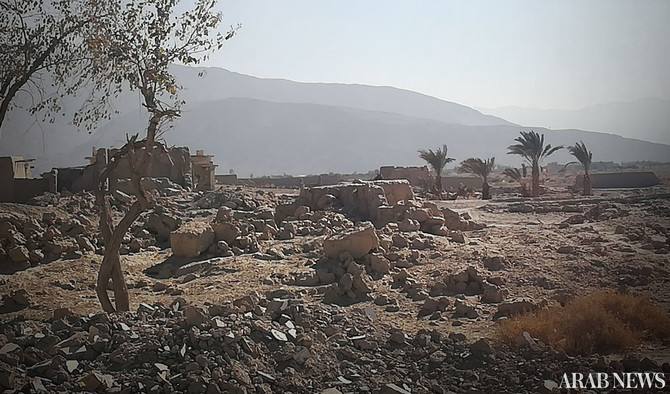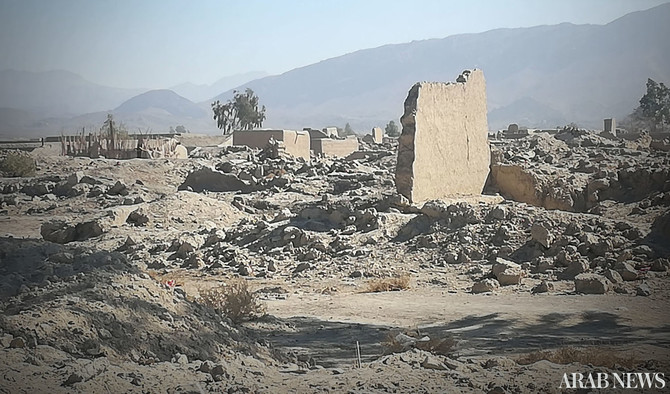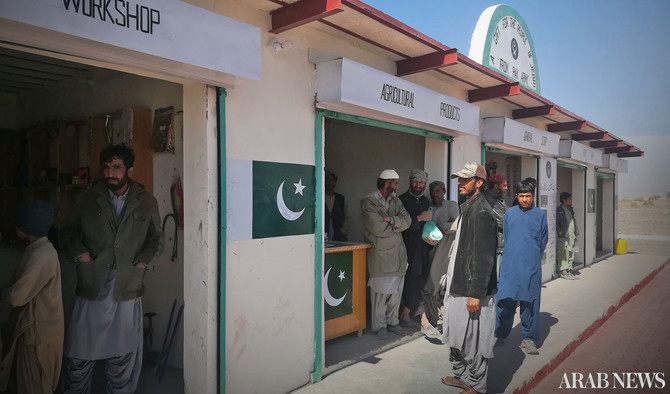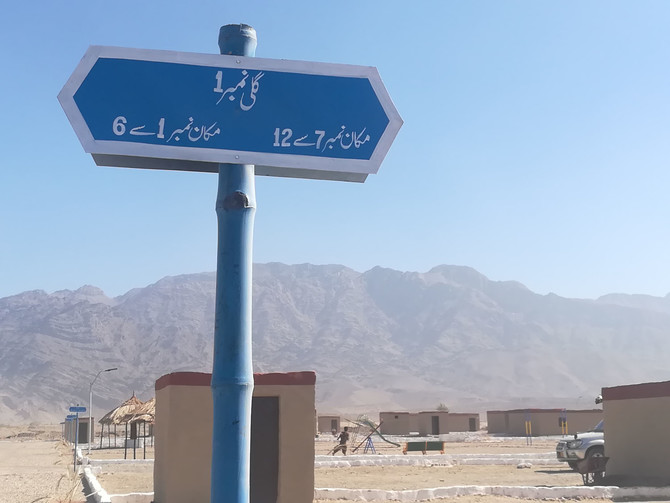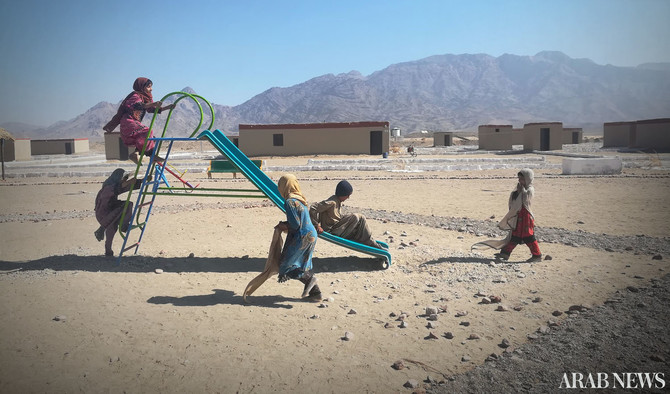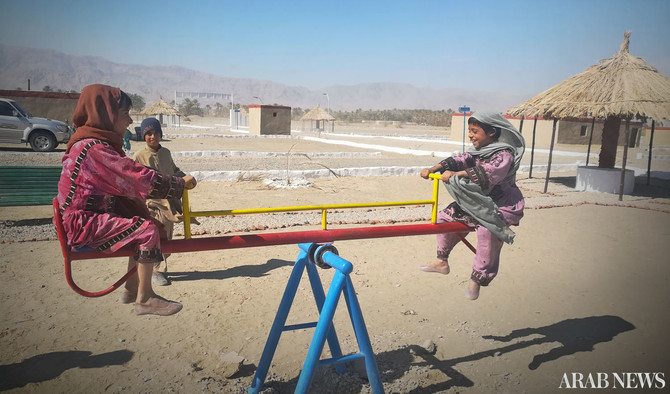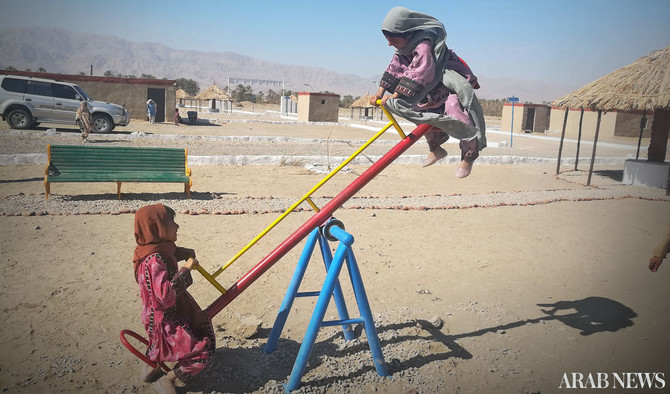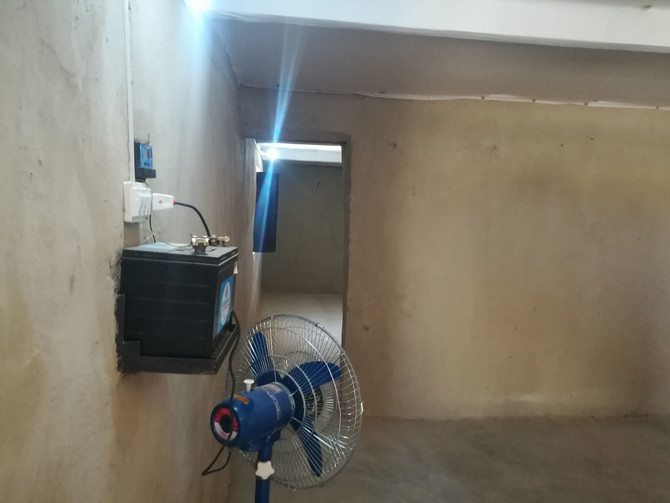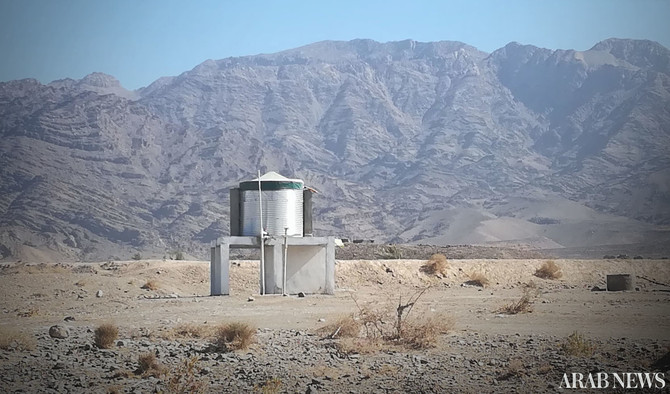MASHKAI, Balochistan: Liaquat Ali, a 30-year-old laborer, couldn’t help but burst into tears of joy when he got the key last month for his new two-room, mud-brick house.
Ali’s former mud home was destroyed five years ago in two devastating quakes in Baluchistan, a huge earthquake-prone province of rugged mountains and deserts in Pakistan’s southwest.
According to official figures, over 825 people died and 200,000 had their lives disrupted when a 7.7 magnitude quake struck on September 24, 2013, followed by another one four days later. The quakes destroyed homes and knocked off communication systems. Ali’s home district of Awaran was the worst affected.
“After all those miserable days, I am happy I got a home,” Ali told Arab News.
“I couldn’t imagine that I would get all these facilities in my hometown,” Ali said as he walked around his house and pointed to a solar panel on his rooftop. He said the home had uninterrupted electricity and water and he paid no bills.
“Our kids have a playground and a school,” Ali said. “What more could we ask for?”
But Ali’s family is only one of thousands that need shelter in Mashkai, the largest of the three administrative divisions that make up Awaran district, with a population of 34,625 people living in a smattering of 94 tiny villages.
The building of the 75-house model village by the Pakistan army is but a tiny blip is the gargantuan rebuilding task that Baluchistan requires.
About 21,000 homes were destroyed across Baluchistan during the earthquake, 9,000 of them in Mashkai alone, forcing thousands of people to live in tents near their wrecked homes or flee to other parts of the province.
“The construction of the model village by the army is a good step but to help thousands of the affectees requires some large-scale efforts by the civilian government, which has the prime responsibility of providing shelter,” said Ahmed Iqbal Baloch, a social activist who owns the Baloch language Vsh News channel.
Locals said the government had done little to help them since the earthquakes but Zahoor Ahmed Buledi, the provincial minister for information, claims the provincial government has provided relief.
“Thousands of homes have been built by the provincial government,” he claimed, declining further comment. However, Baloch said no houses had been built. “The government had given Rs50,000 per family, an amount which was insufficient for constructing a house,” Baloch said.
Baluchistan, which borders Iran and Afghanistan, is one of the poorest regions of Pakistan and has some of the worst health indicators in the country.
The province is also home to Baloch militants engaged in a decades-long conflict with the central government which they accuse of discrimination in distribution of revenues from oil, gas and minerals.
The 2013 quake was followed by a spate of attacks on army and paramilitary troops. Two soldiers delivering relief supplies were killed by a roadside bomb near Awaran, rockets fired by the militants narrowly missed military helicopters carrying aid and there were several attacks on relief convoys.
“Since violence was at its peak [when the earthquakes took place], neither government nor NGOs [non-governmental organizations] could enter the area,” said Baloch, the social activist. “Even then Chief Minister Dr. Abdul Malik failed to enter area.”
Security in Baluchistan has improved since as thousands of militants have surrendered amid vast investment from Beijing’s Belt and Road infrastructure splurge. A new transport corridor, the China Pakistan Economic Corridor through Baluchistan, will link Western China with Pakistan’s Arabian Sea port of Gwadar and is due to be operational soon.
While militants vow to disrupt work on the corridor a senior security official in Gajjar, the headquarter of Mashkai, said the military had made major security gains. He described a time when a local college was turned into the head office of the Baloch Liberation Front and no cars could travel in the area after dark.
“The civilian administration was almost non-existent,” said the official, who declined to be named as he was not authorized to speak to journalists on the record. “But now private vehicles pass by without fear, even during nights. The people can send their children to school and bazaars are open. The peace has been restored”
He said the army had launched many projects in the area including renovating schools, setting up a telemedicine facility and opening vocational training centers.
“As the people of this poor and neglected area cannot afford to construct houses, we also thought constructing a model village could bring some relief to lives of some of the [earthquake] affectees,” the official said.
Work on the model village, which cost Rs.15 million, began on May 26 last year and was completed on December 14.
“This mega project has been built on a self-help basis by the army in short span of six months,” a statement by the military’s media wing said, adding that in addition to the homes, the village also had a mosque, children’s play area and soccer and cricket grounds.
But Ali said a lot more needed to be done.
“We need more such houses,” he said. “We need roads and employment to come.”
Balochistan residents get ‘model homes’ five years after quake
Balochistan residents get ‘model homes’ five years after quake

- Army inaugurated Rs.15 million 75-house village in December
- The model village has soccer and cricket grounds, mosque, school and children’s play area
Pakistan accuses India of targeting civilians along Kashmir border amid intensifying hostilities

- Army spokesperson says Pakistan has limited its response to Indian military posts across the LoC
- He denies Indian claims Pakistan launched large-scale drone and missile attacks across the border
ISLAMABAD: Pakistan’s military on Friday accused India of deliberately targeting civilians along the Line of Control (LoC), the de facto border in the disputed Kashmir region, as tensions between the two nuclear-armed neighbors escalated sharply this week.
Fighting between the South Asian rivals intensified after India carried out strikes on multiple locations in Pakistan on Wednesday, in response to a deadly April 22 attack in Indian-administered Kashmir that left 26 tourists dead. New Delhi blamed Islamabad for the attack, a charge Pakistan has denied.
In the days since, Pakistan has claimed to have downed five Indian fighter jets and over 75 drones, while India said it had retaliated against Pakistani air and drone assaults by destroying an air defense system in Lahore.
The cross-border violence also had a devastating impact on civilians living along the LoC, with both sides trading heavy fire over the past two days.
“Pakistan has been receiving the Indian artillery shelling,” the military’s spokesperson, Lt. Gen. Ahmed Sharif Chaudhry, told Türkiye’s TRT World in an interview.
“Unfortunately, they are targeting, deliberately targeting, the civilians,” he continued. “Pakistan is now firing on the posts from where the [Indian] artillery and the military are firing. We are concentrating and putting our fire only on military targets.”
Chaudhry said Pakistan’s response was defensive and restrained, limited to small arms fire against Indian military positions.
He also denied New Delhi’s claims that Pakistan had launched large-scale drone or missile attacks across the international border, calling them “fabrications” designed to fuel a “media frenzy.”
“Since last night, they [India] have created a media blitz that Pakistan has launched drones, aircraft and a massive attack across the international border,” he said, adding: “In 21st century warfare, everything has an electronic signature. If there have been attacks with missiles from the Pakistani side, there has to be an electronic signature.”
Chaudhry further accused India of “gagging” international and domestic media as well as controlling digital platforms, saying it was using its new organizations to spread disinformation hour after hour.
The LoC has long been a flashpoint between India and Pakistan, both of which claim the disputed Kashmir region in full but control only parts of it. The latest hostilities mark one of the most serious flare-ups in decades.
Pakistani stocks surge sharply on IMF optimism, hopes of easing India-Pakistan standoff

- The benchmark KSE-100 index rose 3,647.82 points, or 3.52 percent, to close at 107,541.45
- India-Pakistan tensions triggered about 12 percent market decline between April 23 and May 8
KARACHI: The Pakistan Stock Exchange (PSX) rebounded sharply on Friday, climbing over 3,500 points, as investor sentiment improved ahead of an International Monetary Fund (IMF) Executive Board meeting and what some analysts described as easing tensions between Pakistan and India.
The benchmark KSE-100 index recovered 3,647.82 points, or 3.52 percent, closing at 107,541.45, after a historic plunge of 6,482 points on Thursday, the largest single-day drop in the index’s history, triggered by fears of an escalating conflict between the two nuclear-armed neighbors.
"The recovery was on account of optimism on IMF Executive Board meeting scheduled to consider Extended Fund Facility (EFF) program, where market expects smooth approval," Topline Market Review said after the end of trading. "Overall decline in cross border hostilities also provided stimulus to investor sentiment."
The EFF, a $7 billion loan program secured by Pakistan in September last year, is aimed at stabilizing the country's economy through structural reforms and fiscal consolidation.
While Pakistan’s authorities say macroeconomic indicators have improved in recent months, they view the IMF support as critical for sustaining gains and transitioning toward growth.
Some analysts also linked the improved investor confidence to what they described as a gradually easing geopolitical situation between India and Pakistan.
"Stocks staged sharp recovery as investor eye de-escalation in Pakistan-India tensions after US appeal for end to violence," Ahsan Mehanti, the Chief Executive Officer of Arif Habib Commodities, told Arab News.
Raza Jafri, the head of Intermarket Securities, said any de-escalation could extend the positive stock market trend.
"Institutional value buying, especially in blue-chip high dividend yielding stocks, saw the KSE100 rebound today," he added.
Tensions between India and Pakistan spiked this week after New Delhi launched missile strikes on multiple locations in Pakistan, blaming Islamabad for a deadly April 22 attack in Indian-administered Kashmir that killed 26 tourists. Pakistan has denied involvement.
The crisis triggered a 12 percent decline in the Pakistani market from April 23 to May 8.
The geopolitical unrest posed a major challenge for Prime Minister Shehbaz Sharif’s efforts to stabilize the economy, which depends on a number of factors including increased foreign investment, exports and revenue generation.
Pakistan’s remittances hit record $31.2 billion in current fiscal year, led by Saudi inflows

- PM Sharif praises overseas Pakistanis for supporting the country’s economic recovery
- Central bank projects remittances to reach $38 billion by end of current fiscal year
KARACHI: Prime Minister Shehbaz Sharif on Friday lauded the contribution of overseas Pakistanis as workers’ remittances surged to a record $31.2 billion during the first ten months of the current fiscal year, with Saudi Arabia emerging as the top source of inflows.
According to data released by the State Bank of Pakistan (SBP), remittances rose by 30.9 percent during July-April FY25 compared to $23.9 billion received in the same period last year.
In April alone, Pakistan received $3.2 billion, showing a 13.1 percent year-on-year increase. The inflows were mainly sourced from Saudi Arabia ($725.4 million), United Arab Emirates ($657.6 million), United Kingdom ($535.3 million) and the United States ($302.4 million).
“Prime Minister Shehbaz Sharif expressed satisfaction over a 31 percent increase in remittances during the first 10 months of fiscal year 2025 compared to the previous year,” a statement issued by his office said.
“Remittances reaching a record level is a reflection of the confidence of overseas Pakistanis in government policies,” it quoted him as saying.
Remittances form a vital pillar of Pakistan’s external sector, helping stabilize the current account, fueling domestic consumption and easing the country’s reliance on external borrowing.
Earlier this year, in March, the SBP recorded an all-time monthly high of $4.1 billion in remittance inflows, driven by seasonal factors and improved formal channel usage.
Pakistan has focused on boosting exports and remittances in recent years as part of broader efforts to strengthen its external sector and address economic vulnerabilities.
The central bank has also revised its FY25 remittance projection upward from $36 billion to $38 billion, citing current trends.
Saudi minister arrives in Islamabad amid India-Pakistan tensions following New Delhi visit

- Adel Al-Jubeir is expected to meet Prime Minister Shehbaz Sharif and General Asim Munir during the visit
- US Secretary of State Marco Rubio contacted the Saudi authorities this week to discuss regional de-escalation
ISLAMABAD: Saudi Minister of State for Foreign Affairs Adel Al-Jubeir arrived in Islamabad on Friday after a visit to New Delhi, as tensions between nuclear-armed India and Pakistan continue to escalate.
Al-Jubeir’s visit follows India’s military strikes inside Pakistan in response to a gun attack in the disputed region of Kashmir that left 26 tourists dead, with New Delhi blaming Islamabad for the incident, though Pakistani authorities repeatedly denied any involvement.
With the two archrivals teetering on the edge of a full-scale war, the United States announced on Thursday that Secretary of State Marco Rubio had discussed regional de-escalation with Saudi officials. The same day, Al-Jubeir also made a surprise stop in New Delhi for talks with Indian officials.
“Deputy Prime Minister and Foreign Minister Senator Mohammad Ishaq Dar will receive Saudi Minister of State for Foreign Affairs Adel Al-Jubeir at the Ministry of Foreign Affairs today,” said an official statement prior to the Saudi official’s arrival in Islamabad.
State media later broadcast visuals of Al-Jubeir disembarking from his aircraft in Islamabad.
According to Pakistan’s Geo News, the Saudi minister is expected to meet with Prime Minister Shehbaz Sharif and Chief of Army Staff General Asim Munir during his visit.
While the Pakistani government has not officially disclosed the purpose of Al-Jubeir’s visit, it is anticipated that discussions will focus on the ongoing conflict between India and Pakistan, as well as other issues of mutual interest.
Saudi Arabia and Pakistan share close diplomatic and strategic relations.
The Kingdom has extended significant support to Pakistan during its prolonged economic challenges in recent years, including external financing and assistance with International Monetary Fund (IMF) loan programs.
Saudi Arabia has also contributed to global peacemaking efforts by hosting talks and mediating prisoner exchanges between Russia and Ukraine.
India’s clash with Pakistan sees use of Chinese missiles, French jets, Israeli drones, and more

- Claims on exactly what was hit in latest standoff and where have differed widely, with neither side releasing many specific details
- Making ongoing conflict even more confusing, the Internet has been “flooded with disinformation, false claims and multimedia
BANGKOK: India’s missile and bomb strikes on targets in Pakistan and Azad Kashmir have spiked tensions between the two nuclear-armed neighbors, with Pakistan’s leader calling the attacks an act of war.
Claims on exactly what was hit and where have differed widely, with neither India nor Pakistan releasing many specific details.
Making the ongoing conflict even more confusing, the Internet has been “flooded with disinformation, false claims, and manipulated photos and videos,” the Soufan Center think tank said in a research note Friday.
“This information warfare is compounded by both sides’ commitment to save face,” it said.
Still, some information can be gleaned from official statements and paired with what is known to gain greater insight into the clash:
Pakistan says it shot down 5 Indian planes involved in the attack
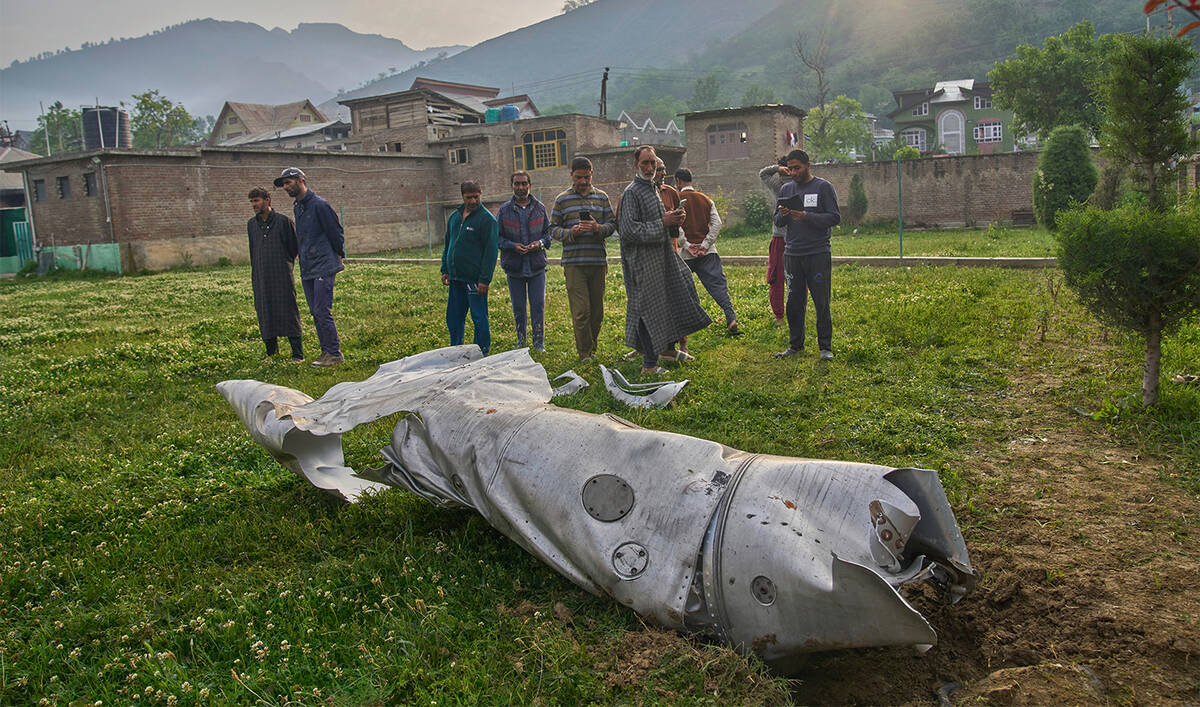
Hours after India’s attack early Wednesday, in retaliation for last month’s massacre of tourists in Indian-controlled Kashmir, Pakistan’s military spokesperson Lt. Gen. Ahmed Sharif claimed that the Pakistan air force had shot down five Indian attack aircraft: three French-made Rafales, a Russian-made SU30MKI and a Russian-made MiG-29.
He said that Pakistan’s air force suffered no casualties, and that all of its aircraft returned safely to base.
Pakistan’s Prime Minister Shehbaz Sharif repeated the claim, saying that the Pakistan air force had the opportunity to shoot down 10 Indian planes, but exercised restraint and downed only the five that had fired on Pakistani targets.
He told Parliament that overall 80 Indian planes had been involved in the attack.
India, meantime, has not acknowledged any losses, though debris from three aircraft came down in at least three areas.
Did it happen that way?
India does have all three types of jets among its more-than 700 combat capable fighter aircraft, according to the International Institute for Strategic Studies’ Military Balance report.
All three aircraft are fighters with the capability of carrying bombs or missiles for ground attacks.
Pakistan and India have both said that their planes did not leave their home airspace, suggesting that if Pakistan’s account is accurate, rather than a dogfight in the skies over Kashmir, Pakistani pilots fired multiple air-to-air missiles over a long distance to take down Indian planes.
Presuming India fired back, even though Pakistan said none of its planes were hit, the aerial skirmish would have been quite the show. But there have been no eyewitness reports of it or video to emerge on social media.
What is known for sure is that Indian planes were in the air and attacked at least nine targets, and that debris from three has been found.
It’s also plausible that Pakistan used surface to air missiles to hit Indian planes — which the war in Ukraine has shown to be very effective and would not have meant risking any of its own planes.
Pakistan has a wide range of such missiles, primarily Chinese-made.
Test of Chinese tech?
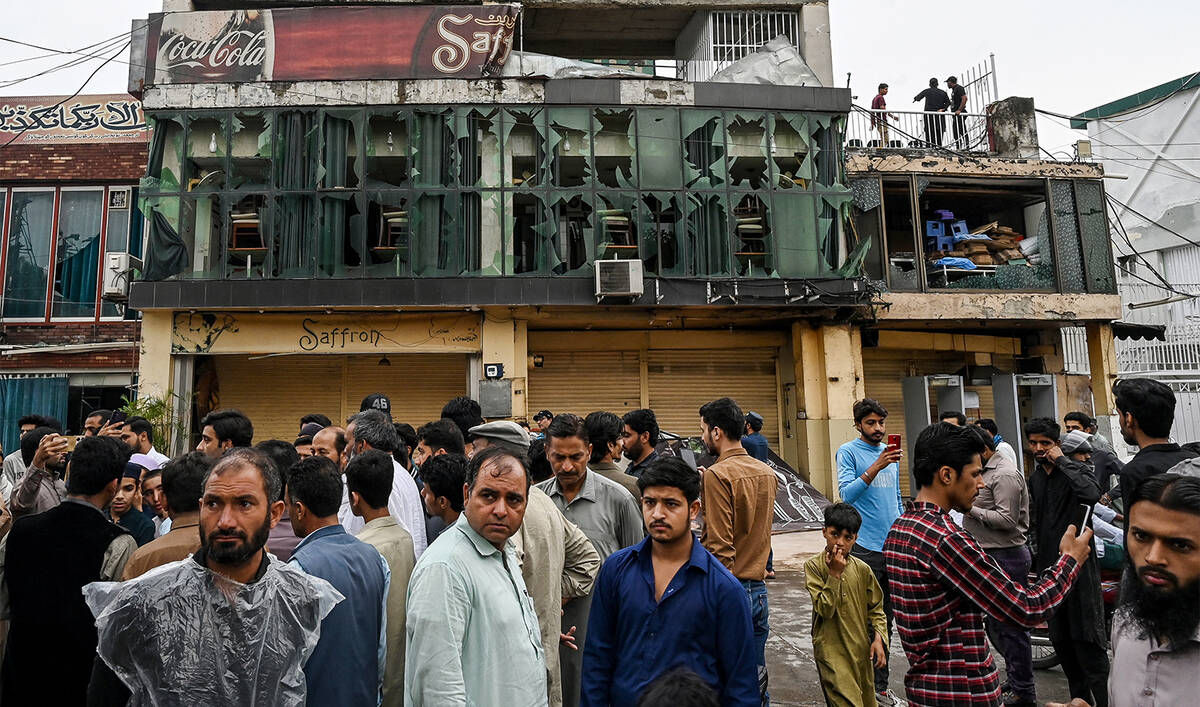
Pakistan’s air force includes American-made F-16s, the French Mirage, and the new Chinese-built J-10C, as well as the Chinese JF-17, which was developed jointly with Pakistan.
In addition to American air-to-air missiles, Pakistan also has several Chinese products in its arsenal, including the PL-12 and PL-15, both of which can be used to fire at targets beyond visual range.
Pakistan’s Foreign Minister Ishaq Dar told lawmakers it was the J-10C that shot down the Indian aircraft, raising the likelihood that Chinese-built missiles were also employed.
“It’s interesting that Pakistan is saying it is using Chinese jets that it has imported from China to shoot down Indian aircraft,” said Lisa Curtis, director of the Indo-Pacific security program at the Center for a New American Security, a Washington think tank.
In 2019, during the rivals’ previous military confrontation, “it was a Pakistani F-16 provided by the United States that was used to shoot down an Indian aircraft,” Curtis said in a conference call. “It’s interesting to see that Pakistan is relying more on its Chinese equipment than it did six years ago.”
The news convinced traders with shares in AVIC Chengdu Aircraft, which builds both the J-10C and J-17, to post large gains Wednesday and Thursday on the Shenzhen Stock Exchange.
Meanwhile, the stock of Dassault Aviation, the maker of the Rafale jet, which is among those Pakistan claims to have shot down, dropped sharply on Wednesday on the Paris Stock Exchange, though had recovered by close on Thursday.
What else is known?
India hasn’t talked about what assets were involved in the attacks. The Indian Defense Ministry said that the strikes targeted at least nine sites “where terrorist attacks against India have been planned.”
Pakistan, meantime, has said 31 civilians were killed, including women and children, in Pakistan-administered Kashmir and the country’s Punjab province, and that buildings hit included two mosques.
India did show video of eight of the strikes at a briefing on Wednesday. four in Pakistan-controlled Kashmir and four in Pakistan.
Both sides have talked about missile strikes, but it was clear from the video that bombs were also dropped on some targets, possibly from drones. In addition to claiming the five Indian aircraft shot down, Pakistan also said it downed an unspecified number of drones on Wednesday.
Indian officials said the strikes were precision attacks, and from the videos shown, it did appear that specific areas of installations were targeted with individual missiles or bombs, rather than widespread areas.
What happened next?
India sent multiple attack drones into Pakistan on Thursday, with Pakistan claiming to have shot down 29 of them.
The drones were identified as Israeli-made Harop, one of several in India’s inventory.
One drone damaged a military site near the city of Lahore and wounded four soldiers, and another hit the city of Rawalpindi, which is right next to the capital Islamabad., according to the Pakistani army.
India did not deny sending drones, but the Defense Ministry said its armed forces “targeted air defense radars and systems” in several places in Pakistan, including Lahore. It did not comment on the claims of 29 being shot down.
India similarly did not comment on Pakistani claims to have killed 50-60 soldiers in exchanges along the Line of Control, though it did say one of its soldiers was killed by shelling on Wednesday.
Pakistani Information Minister Attaullah Tarar, meantime, denied Indian accusations that Pakistan had fired missiles toward the Indian city of Amritsar, saying in fact an Indian drone fell in the city.


